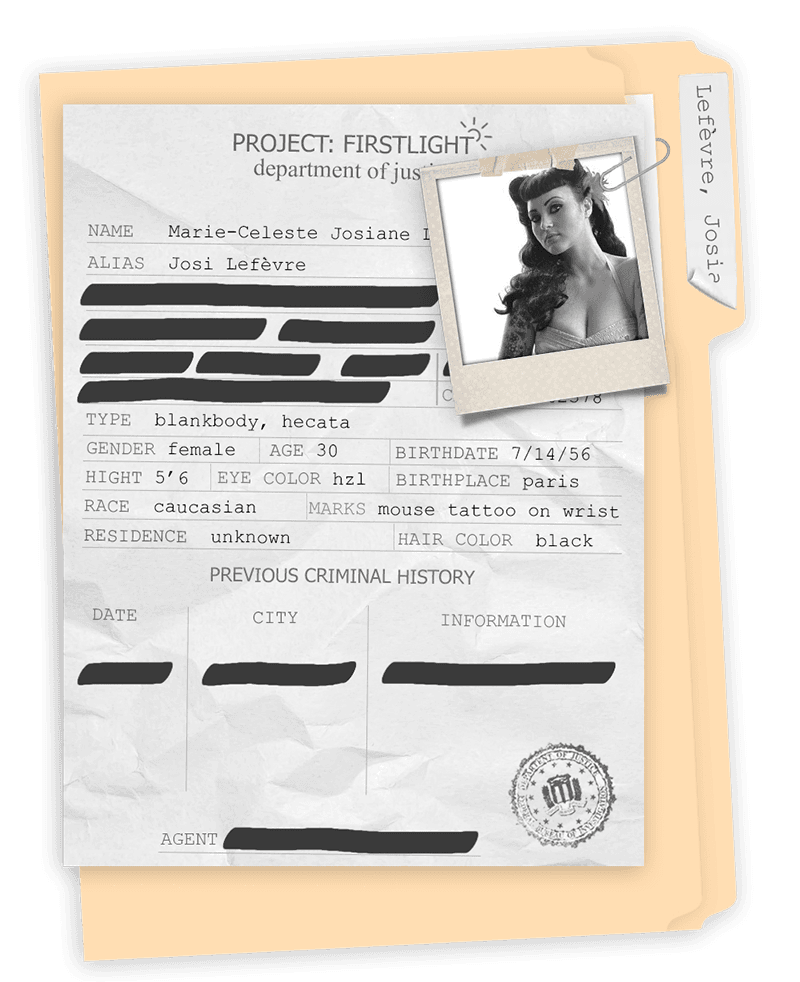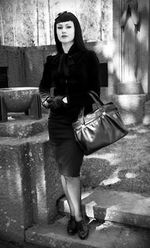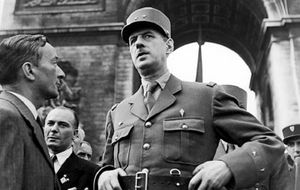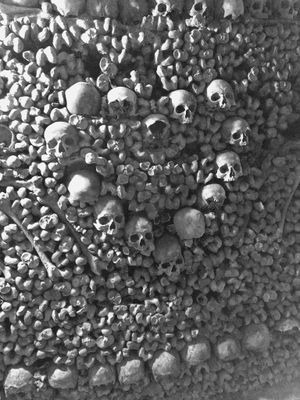PC Lefevre
EXPERIENCE POINTS: 10
SUMMARY
Mademoiselle Lefévre is a member of the newly formed Clan of Death, or Hecata vampires. Originally from Paris, France, she is a true romantic, growing up surrounded by the architecture, history, and rich culture of the city where so many romantic tales are set, she longs to live out a grand love story of her own. She is first and foremost, however, a scientist, her passion and proficiency for her chosen field of thanatology has propelled her to success and recognition as far away as New York City where she now works as the lead scientist in charge of special projects at the Center for Thanatology Research and Education.
Player: Kat Vee
Name: Marie-Céleste Josiane Lefévre
Epitaph: n/a
Clan: Hecata
Sire: Pius Aurelius Augustus
Embraced: August 10th, 1984 (Birth: July 14th, 1956)
Apparent Age: 25
Nationality: French
Ethnicity: Caucasian
Hair: Black
Eyes: Hazel
Height: 1.67 m (5'6")
Weight: 68 kg (150 lb)
Gender: Female
Ambition: Obtain permission to live in the Nosferatu Warrens with her true love, Alter Klein.
Convictions: Never Deny True Love / Demand Respect & Respect Others / Knowledge Takes Prescedence
Touchstones: Alter Klein / Étienne DuParaquette / Lucía Vásquez
Humanity: 7
Generation: 13th
Blood Potency: 1
Attributes: Strength 1, Dexterity 3, Stamina 3, Charisma 2, Manipulation 2, Composure 2, Intelligence 3, Wits 4, Resolve 2
Secondary Attributes: Health 6, Willpower 4
Skills: Athletics (Caving) 2, Firearms 1, Survival 2, Etiquette 3, Persuasion 1, Academics (Anthropology) 3, Awareness 1, Investigation 2, Medicine (Cadavers) 3, Science (Thanatology) 4, Technology 1
Disciplines: Oblivion 3, Fortitude 2
Ceremonies: Gift of False Life, Awaken Homuncular Servant
DESCRIPTION
Sporting an athletic build from her caving days, Josiane can usually be found in precisely fitted black business wear under her lab coat while she is working. When she hits the streets however, Josi likes to style herself in the gothic/punk trappings of fishnets, leather, spikes, and chains, smearing her face with plenty of kohl eyeliner and black lipstick. She keeps a few more elaborate gowns in her collection for important events, the pride of this collection being a meticulously restored Victorian era mourning gown complete with petticoats and funeral veil.
LANGUAGES
Spoken: French, English
Read: French, English, Latin
HAVEN
Dedicated to the study of mortality, the Center for Thanatology Research & Education was established in 1986 to acquaint teachers, scholars and the general public with approaches to using cemeteries as art and historical resources. The center conducts cemetery tours for students, adults and professionals during which the various art historical periods in which gravestones, landscaping and mortuary structures were built are explored. There are lessons, too, on outdoor sculpture, hand-carved lettering as a craft, ethnic cemeteries and more. In addition, the center houses a library and a museum, a large autopsy theater, publishes its own books and periodicals and sells works of other publishers related to its mission.
Josiane resides in a secret sub-basement of the Center's main facility, with entrances through the building as well as a mausoleum above the crypts in the cemetery that surrounds the building. This is complete with living quarters, computer access, a functioning surgical bay, and mysteriously, an ancient Roman shrine.
HISTORY
Born just two years before the fall of the Fourth French Republic, Marie-Céleste Josiane Lefévre, or “Josi” as her friends call her, is the only child of young French socialist professors Charlotte Anne Françoise Du Maurier, and Jean-Baptiste Fabien Lefévre. Her parents met while attending The Sorbonne University in Paris, her mother studying art and medicine and her father, history and philosophy. Though they couldn’t have been from more different worlds, her mother being from a wealthy, aristocratic Parisian family, and her father, the son of farmers from rural Provence, they were united by their radical politics and fell quickly in love, much to the Du Maurier family’s chagrin.
The Lefévres opposed the military backed, Gaullist coup of the Republic and protested for the liberation of Algiers from French colonial control. Though both were raised Catholic, they brought up their daughter to question religion and so called moral authority, they encouraged her to study medicine and science, and imparted their love of philosophy to her from a young age.
Josi did well at university and was actively pursuing degrees in history and medicine when she became involved with les UX, short for Urban eXperiment, an underground (literally and metaphorically) movement that improves forgotten corners of Paris. Forming in 1981, Josi became an early member of the all-female infiltration team “The Mouse House”, with whom she helped steal maps and plans for the city’s vast network of underground ossuaries, abandoned quarries, and mining tunnels.
With plans in hand, les UX began secretly restoring medieval crypts and monuments lost to time and decay around and beneath the bustling heart of the city, which they then used to stage free plays, concerts, and readings. Josi quickly became enamored with the Paris Catacombs, spending increasing amounts of time exploring, mapping, and photographing them, though she did all this under the pretense of research and work for les UX, truthfully she never felt more at home than she did in the company of those ancient bones.
Entranced by her new love of the Catacombs, Josi began to pivot her medical studies to the newly emerging field of Thanatology, just as the study of death was finally gaining a foothold of legitimacy in the scientific world. She took to it with a natural ease, and excelled in her field, garnering her the attention of the nascent Center for Thanatology Research and Education located in New York City. Through a series of letters and phone calls at odd hours, Josi learns of, interviews for, and accepts a position at the Center as their lead scientist in charge of special projects.
Though the decision to leave her precious Catacombs behind was tough, the opportunity to put herself on the bleeding edge of this new science was too hard to pass up. Josi brushed up on her English, said excited goodbyes to her parents and friends, and set off for Brooklyn, New York, where unbeknownst to her, an ancient Roman vampire lurked behind the scenes, planning a return to his former glory.
Upon her arrival to America, Josi settles in to the hustle and bustle of New York City with ease, its crowded main streets reminding her of the surging pulse of Parisian thoroughfares. About a month or so into her new life, Josi receives word that a benefactor of the Center for Thanatology, a Dr. P. A. Augustus, is on his way back to the States from a conference in Rome and is anxious to meet with her that evening to formally welcome her and convey his admiration of her work. Nervous and excited, she waits at the office after hours for his arrival, organizing a detailed update on how her massive project of cataloguing the prolific cemeteries of NYC is proceeding thus far. As the hours wind on, Josi begins to fall asleep at her desk and is awaked with a start to the touch of a gloved hand upon hers.
She spins in her chair and comes face to face with a towering figure in white linen robes, wearing an intricately carved, beautifully decorated golden mask. In the dim lighting of the after-hours office, she can see only darkness through the holes in the mask, but a voice, smooth and refined, yet oddly accented, emanates from behind it.
“Be not afraid, my daughter. Many gifts I shall bear unto you.”
Startled, but entranced, she stands and follows as the figure leads her through previously unseen corridors. He leads her to a secret sub-basement within the facility, complete with living quarters, a small, but fully equipped medical bay, and a lavishly decorated chamber containing what looks like an ancient Roman shine and an enormous stone sarcophagus. Stopping before the shine, the otherworldly figure turns, and at once, folds his arms around Josi, encompassing her in a firm, but familiar feeling embrace, almost as if he was welcoming home his long absent child.
After this fateful meeting with her Sire, Josi continued to thrive in her role at the Center for Thanatology, and took to being a vampire with relative ease. Despite these successes, she struggled with a touch of homesickness, and longed for the comfort of the Catacombs. She soon found refuge, and made fast friends in New York’s burgeoning Goth and Punk scenes. Through the scene she learned of New York’s underground network of abandoned subway tunnels and began eagerly exploring them.
It was during her explorations one night that she felt a presence following her, she had often felt something similar before, deep in the catacombs beneath Paris. She had always imagined this as a sort of genus loci, and believed that if she remained respectful of her surroundings, the spirit would be pleased and not harm her.
Going about her explorations night after night, Josi began whispering to the “spirit” of the tunnels. She told it about where she came from, the ancient crypts she loved and helped to preserve, the songs and plays and poems she’d recited in them, and the times she’d sought the deep, dark solitude of the catacombs to calm her during the political turmoil of Paris in the early 80’s. What she didn’t know, was that the “spirit” of the tunnels was indeed listening, though he was no spirit at all, but a member of the local Nosferatu vampire clan, and he was becoming increasingly enamored with her.
Though unsure how to reveal himself to her initially, and afraid she would balk at his gruesome appearance, Alter Klein, decided one night that he couldn’t just follow her around any longer. She deserved to know that he had been watching her, and she was getting dangerously close to infringing upon Nosferatu territory, which could have serious consequences should she be discovered by anyone else from the clan. That night, as Josi was singing “Compagnons de la Marjolaine,” an old French folk song about a night watch captain looking for love, Alter began to sing back, recalling the lines from his time in France during the Second World War. Josi stopped in her tracks, but continued to sing, eyes wide with fear-laced excitement. By the end of the tune, Alter had stepped from the shadows, trying his best not to look too imposing.
Intrigued and unsure if he was even real, Josi slowly extended a hand forward to touch him, and, emboldened by her not screaming and running away, Alter bent and gently kissed it. Enchentés were exchanged, followed by Alter explaining that he wasn’t the spirit of the tunnels, and certainly was not the same entity who inhabited the Parisian Catacombs. Since then they spend most nights together, Alter showing her around the city with Josi eagerly listening to his tales of the war and of growing up a mixed race Jewish man in Depression Era America.










